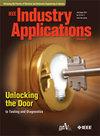基于频率自适应重复控制的双腿共享故障后零序电流消除策略
IF 4.5
2区 工程技术
Q2 ENGINEERING, ELECTRICAL & ELECTRONIC
引用次数: 0
摘要
现有的零序电流消除方法在故障后运行时的消除效果不理想,主要是由于开端绕组两端死区时间不等,导致零序电流显著,三相电流不平衡。本文提出了一种基于频率自适应重复控制(FARC)的低频电机驱动ZSC消除策略,以完全消除变频器开路故障后PF运行时的ZSC。与传统的ZSC消除方法相比,该策略仅通过对ZSC进行闭环控制,就能有效地消除ZSC的基频干扰、三频干扰和附加频率干扰。为此,提出并设计了一种基于FARC的方法,通过消除来自逆变器和机器侧的周期性干扰来实现ZSC回路的零稳态跟踪误差。在此基础上,综合分析了正常运行和PF运行时死区时间对ZSC的影响。此外,提出了一种解耦空间矢量调制技术,通过在一个占空比内不均匀分布两个逆变器支路的零序电压控制信号来产生所需的零序电压。最后,在dSPACE平台上用OW感应电机对该策略进行了仿真和实验验证。本文章由计算机程序翻译,如有差异,请以英文原文为准。
Zero-Sequence Current Elimination Strategy Based on Frequency-Adaptive Repetitive Control of OW Machines During Leg-Sharing Post-Fault Operation
Existing zero-sequence current (ZSC) elimination methods have unsatisfactory elimination performance during post-fault (PF) operation due to unequal dead time effects on the terminals of the open-end winding (OW) machine, resulting in a significant ZSC and unbalanced three-phase currents. This article proposes a new ZSC elimination strategy based on frequency-adaptive repetitive control (FARC) for OW machine drives to fully eliminate the ZSC during PF operation following inverter open circuit faults. In contrast to the traditional ZSC elimination methods, the proposed strategy can effectively eliminate the fundamental, triple, and additional frequency disturbances of the ZSC by only implementing ZSC closed-loop control. To this aim, a FARC based approach is proposed and designed to realize a zero steady-state tracking error of the ZSC loop by eliminating periodic disturbances that originate from both inverter and machine sides. Furthermore, a comprehensive analysis of the dead time effects on the ZSC during both healthy operation and PF operation is carried out. In addition, a decoupled space vector modulation technique is developed to produce the required zero-sequence voltage (ZSV) by unequally distributing the ZSC control signals of the legs of the two inverters within one duty cycle. Finally, the proposed strategy is verified via both simulations and experimentally on a dSPACE platform with an OW induction machine.
求助全文
通过发布文献求助,成功后即可免费获取论文全文。
去求助
来源期刊

IEEE Transactions on Industry Applications
工程技术-工程:电子与电气
CiteScore
9.90
自引率
9.10%
发文量
747
审稿时长
3.3 months
期刊介绍:
The scope of the IEEE Transactions on Industry Applications includes all scope items of the IEEE Industry Applications Society, that is, the advancement of the theory and practice of electrical and electronic engineering in the development, design, manufacture, and application of electrical systems, apparatus, devices, and controls to the processes and equipment of industry and commerce; the promotion of safe, reliable, and economic installations; industry leadership in energy conservation and environmental, health, and safety issues; the creation of voluntary engineering standards and recommended practices; and the professional development of its membership.
 求助内容:
求助内容: 应助结果提醒方式:
应助结果提醒方式:


